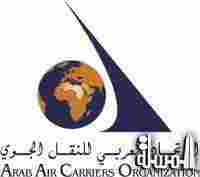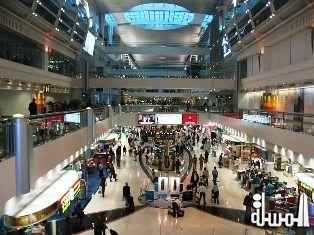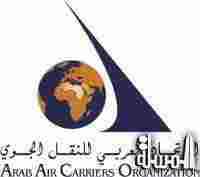
Results of AACO 47th AGM : AACO agrees joint emergency planning initiative
Almasalla, ATP News- The Arab Air Carriers Organization (AACO) convened its 47th AGM today in Dubai under the Chairmanship of Sir Tim Clark, AACO 47th AGM Chairman and President of Emirates Airline. The AGM was held under the Esteemed Patronage of HH Sheikh Ahmed Bin Saeed Al Maktoum, President, Dubai Civil Aviation Authority, Chairman & Chief Executive Emirates Airline & Group, and Chairman Dubai Airports.
Participation
 The AGM gathered CEOs of AACO member airlines, AACO partner airlines and industry partners from aircraft and engine manufacturers, Global Distribution Systems (GDSs), IT providers and other specialized companies relevant to the Arab air transport industry. The AGM also welcomed the Arab Civil Aviation Commission (ACAC), the International Air Transport Association (IATA), and a number of regional airline associations, where the number of delegates overpassed 300.
The AGM gathered CEOs of AACO member airlines, AACO partner airlines and industry partners from aircraft and engine manufacturers, Global Distribution Systems (GDSs), IT providers and other specialized companies relevant to the Arab air transport industry. The AGM also welcomed the Arab Civil Aviation Commission (ACAC), the International Air Transport Association (IATA), and a number of regional airline associations, where the number of delegates overpassed 300.
Arab Air Transport Statistics in 2013
Delegates received AACO’s Annual Report, which reflects the yearly harvest of AACO’s work during the past term and highlights the latest developments and challenges at industry level in addition to the achievements of AACO joint projects over the past year. The delegates also received a copy of the Arab Air Transport Statistics publication (AATS) covering 2013 data. Major statistics included in AATS were as follows:
The Arab air transport market grew by 10.1% in 2013 compared to 2012, reaching 156 million passengers.
Passenger numbers using Arab airports in 2013 increased by 5.2% to reach around 274 million passengers.
Cargo movement at Arab airports increased by 5.6% in 2013 reaching 6.5 million tons of cargo.
AACO members served 412 destinations in 127 countries with 3,851 average daily flights, offering 750,943 daily seats on 1,069 aircraft.
AACO members’ operating revenues increased by 10% in 2013 to record USD 35.8 billion for 15 member airlines.
Same AACO members carried more than 153 million passengers in 2013 (an increase of 7.5% compared to 2012) and 4.8 million tons of cargo (an increase of 11.6% compared to 2012).
Tribute to the Late Dr. Assad Kotaite
At the start of the AGM sessions, Sir Tim Clark asked the attendees to dedicate a minute of silence to the late Dr. Assad Kotaite, who spent most of his life in the aviation field; mostly leading the International Civil Aviation Organization during hard times with a vision, diplomacy and wise leadership that are a role model to be followed in international aviation relations.
Tribute to H.E. Eng. Khalid Almolhem
The AGM also paid a tribute to H.E. Eng. Khalid Almolhem, former Director General of Saudia. During his tenure in Saudia, H.E. Almolhem was elected as a member of the Executive Committee in 2006, then as Chairman of the Executive Committee in 2008 and Chairman of AACO AGM in 2009 where he contributed in strengthening and supporting AACO’s work.
AACO Secretary General Report
AACO Secretary General presented his report on the Arab air transport, covering strengths and weaknesses of the sector, its opportunities for growth and the threats that this sector faces. In addition, the Secretary General addressed a number of strategic issues that are of interest to members and AACO’s work with regards to those issues.
Some of the important industry issues highlighted in the Secretary General’s report were as follows:
Air Traffic Management as the primary weakness of the Arab air transport
The Secretary General highlighted that the primary weakness of the Arab air transport lies in air traffic management and that the optimal solution of that issue will have to go through three major milestones: firstly, the renovation of air navigation systems and equipment, secondly coordination between civil and military authorities for flexible use of airspace by civil aviation when national security does not require it to be limited to military use, and thirdly (and most importantly) the development of a traffic flow management coordination mechanism on regional and sub-regional levels which should evolve to cover the whole region.
The importance of liberalization and facilitation of the movement of people and goods
The Secretary General highlighted the second weakness of the Arab air transport, as being some protectionism policies that if adopted as strategies rather than temporary measures could be a threat to the future of Arab air transport, and hence called for liberalization to be based on the economic principles of the Damascus Convention and to be accompanied with the facilitation of the movement of people and goods in order to fully benefit from growth opportunities of the Arab air transport.
Calls in the EU and US for adopting protectionism measures
The Secretary General also sighted calls in Europe and the US for adopting measures that protect airlines, highlighting that the deterioration of the competitiveness of some airlines and airports in Europe and the United States is actually due to measures applied by these regions’ governments which consider airlines cash cows and burden airlines and airports, unlike other transportation sectors, with an array of regulations. Most importantly, the Secretary General highlighted the consultation paper that was issued by the European Commission on amending directive 868/2004 on fair competition, noting that the language in the paper implies a protective mentality which, if applied, will create a bigger dispute than the one created by the infamous EU ETS in its original extraterritorial form. The Secretary General hoped that the European Commission takes into consideration the fact that its regulations can only be applied to its countries and institutions, as other countries have their own laws and regulations which do not necessarily mirror European ones, and mutual consent – rather than one party dictating its point of view- should be the basis of any agreement.
Airlines’ relation with the customer
The Secretary General also talked about the relationship between airlines and customers that is still governed by technologies developed in the 70’s and 80’s and which have so far only received a facelift at best, and therefore do not provide airlines with the chance to design their products’ attributes according to their customers’ needs. The Secretary General commended IATA’s NDC as an important step in the right direction. He also called upon IT partners and other players to upgrade their technology infrastructure so that the customer can enjoy the same experience he/she enjoys in his/her interaction with suppliers in other industries.
Speech by Director General of ACAC
Eng. Mohamed Sherif, Director General of the Arab Civil Aviation Commission (ACAC), presented a keynote address about the common issues between AACO and ACAC in the fields of aeropolitics, relations between the Arab world and the EU, air safety, environment, and air navigation issues, whereby the two organizations have cooperated throughout the years in order to achieve benefits in these areas to the Arab air transport industry.
Speech by IATA
Mr. Paul Steele, Senior Vice President, Member & External Relations, Corporate Secretary of IATA, presented IATA’s speech on industry issues. Mr. Steele focused in his speech on safety, air traffic management, and smarter regulations in the areas of liberalization, passenger rights, security, taxation and other regulations.
An Agreement for Emergency Response Mutual Assistance
Under AACO’s framework to enhance cooperation and the sharing of expertise between AACO member airlines, 10 AACO members signed an “Emergency Response Mutual Assistance Agreement” during the AGM. The airlines are Air Arabia, EgyptAir, Emirates Airline, Etihad Airways, Gulf Air, Kuwait Airways, Middle East Airlines, Oman Air, Qatar Airways, and Saudia.
AACO Members’ Closed Session Adopts Three Strategic Resolutions
The Second Working Session was dedicated to AACO members where they discussed the Executive Committee report which covered strategic issues in addition to AACO’s financial and administrative issues.
Based on the recommendations of the Executive Committee, AACO’s AGM adopted four strategic resolutions as follows:
1. Air Traffic Management and Airspace Capacity in the Arab World: AACO 47th AGM welcomed and acknowledged ICAO’s establishment of the Middle East ATM Enhancement Programme. The AGM thanked Arab governments for supporting the role of the air transport industry as an essential contributor to the sustainable development and further appreciated the efforts of Arab governments which are developing their aviation infrastructure. Moreover, the AGM also called upon Arab governments to coordinate their aviation infrastructure’s developments in order to alleviate bottlenecks from the region as a whole through three major milestones:
Renovation of air traffic systems and equipment where required.
Increase coordination on the national level with military authorities for flexible use of airspace by civil aviation when national security does not require it to be limited to military use.
Development of traffic flow management units on sub-regional levels which should evolve to cover the whole region, and without which individual investments will only result in relocating bottlenecks within the region.
Furthermore, the AGM directed AACO to continue collaborating with ACAC, ICAO, IATA and CANSO to promote, plan and implement regional initiatives aiming at enhancing air traffic management and airspace capacity in the region.
2. Empowering Governments to prosecute Unruly Passengers on board flights: The AGM called for:
Prioritizing the ratification of Montreal Protocol 2014 due to the benefits that it brings to governments, airlines, and passengers alike in terms of widening the jurisdiction of governments to prosecute unruly passengers, lessening operational disruption and costs incurred by airlines, and bringing convenience to passengers affected by an unruly behavior inflight.
Considering the adoption or amendment of supporting domestic legislation to secure the proper activation of jurisdictional and prosecution powers using ICAO Circular 288 as a guide.
Raising public awareness of the consequences of failing to follow crew instructions or commit unruly behavior.
3. Safety and Security: Following the unfortunate tragedies that befell on Malaysia Airlines flights MH370 and MH17, the AGM expressed its profound sympathies to the families of the missing and the victims. Moreover, the AGM strongly condemned the downing of Malaysia Airlines flight MH17. The AGM also called upon the industry to lead relentless efforts to find the reasons behind the disappearance of MH370. Knowing the reasons behind that disappearance will not only bring closure to the grieved families of the missing but also will provide essential information to avoid such a mishap from ever happening again. Moreover, the AGM called upon all concerned stakeholders to develop and implement measures to ensure that systems communicating the location of the aircraft cannot be tampered with or interfered in, ensuring the visibility of the flight at all times. Finally, the AGM also believed that it is the duty of the industry to establish an exchange mechanism for sharing assessment of airlines with regards to the threats affecting air routes so that airlines using the same routes may take that into account when assessing the operational safety of those routes.
Panel Discussion on “What’s Next for Arab Airlines” and “Whether Protectionism Policies Can Really Protect Airlines”
The Third Working Session, as usual, gathered all invitees of AACO AGM and witnessed the “Joint Aviation Forum”, which is a panel discussion that was moderated this year by Mr. Richard Quest, CNN Anchor and Correspondent. The Joint Aviation Forum featured a session on “What’s Next for Arab Airlines” and “Can Protectionism really protect Airlines?”. Participants in this discussion were as follows:
H.E. Mr. Akbar Al Baker/ Group Chief Executive Officer/ Qatar Airways
Mr. Mohamed Salah Boultif / President & Chief Executive Officer/ Air Algerie
Capt. Sameh El Hefny/ Chairman & CEO / EgyptAir Holding Company
Mr. Ahmed Al Nemah / Acting Undersecretary for Civil Aviation Affairs for the Kingdom of Bahrain
Mr. Adel A. Ali/ Group Chief Executive Officer/ Air Arabia
Mr. Paul Gregorowitsch / Chief Executive Officer / Oman Air
New AACO logo
In preparation for the golden jubilee of AACO in 2015, AACO presented a new modern logo that was designed during 2014 in coordination with AACO Executive Committee. The AGM adopted this logo as AACO’s new logo with immediate effect.
Closing of the AGM Working Sessions
As the AGM came to a close, AACO members thanked the 47th AGM Chairman, Sir Tim Clark, for chairing the AGM and for the generous hospitality of Emirates for all delegates of this event. Moreover, the Secretary General announced that the forthcoming AACO AGM will be held in Jeddah, Kingdom of Saudi Arabia, on 24-26 November 2015.







